Related Research Articles

Gilles Deleuze was a French philosopher who, from the early 1950s until his death in 1995, wrote on philosophy, literature, film, and fine art. His most popular works were the two volumes of Capitalism and Schizophrenia: Anti-Oedipus (1972) and A Thousand Plateaus (1980), both co-written with psychoanalyst Félix Guattari. His metaphysical treatise Difference and Repetition (1968) is considered by many scholars to be his magnum opus. An important part of Deleuze's oeuvre is devoted to the reading of other philosophers: the Stoics, Leibniz, Hume, Kant, Nietzsche, and Bergson, with particular influence derived from Spinoza. A. W. Moore, citing Bernard Williams's criteria for a great thinker, ranks Deleuze among the "greatest philosophers". Although he once characterized himself as a "pure metaphysician", his work has influenced a variety of disciplines across the humanities, including philosophy, art, and literary theory, as well as movements such as post-structuralism and postmodernism.
Post-structuralism is a term for philosophical and literary forms of theory that both build upon and reject ideas established by structuralism, the intellectual project that preceded it. Though post-structuralists all present different critiques of structuralism, common themes among them include the rejection of the self-sufficiency of structuralism, as well as an interrogation of the binary oppositions that constitute its structures. Accordingly, post-structuralism discards the idea of interpreting media within pre-established, socially constructed structures.
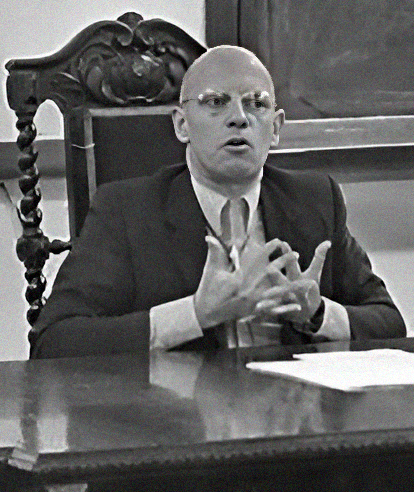
Paul-Michel Foucault was a French philosopher, historian of ideas, writer, political activist, and literary critic.
Foucault may refer to:
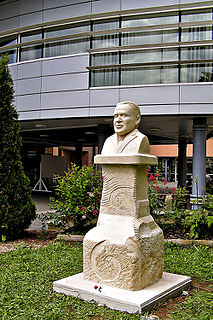
Jean Hyppolite was a French philosopher known for championing the work of Georg Wilhelm Friedrich Hegel, and other German philosophers, and educating some of France's most prominent post-war thinkers. His major works include Genesis and Structure of Hegel's Phenomenology of Spirit and Studies on Marx and Hegel.
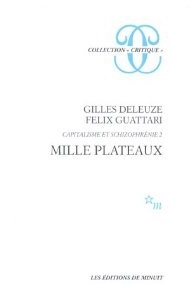
A Thousand Plateaus: Capitalism and Schizophrenia is a 1980 book by the French philosopher Gilles Deleuze and the French psychoanalyst Félix Guattari. It is the second and final volume of their collaborative work Capitalism and Schizophrenia. While the first volume, Anti-Oedipus (1972), sought to "short-circuit" a developing "bureaucracy of analytic reason" in France, A Thousand Plateaus was created as a "positive exercise" in nomadology and rhizomatic philosophy.
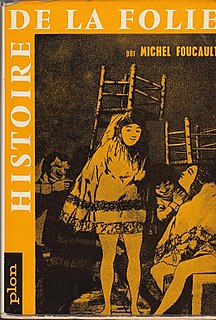
Madness and Civilization: A History of Insanity in the Age of Reason is an examination by Michel Foucault of the evolution of the meaning of madness in the cultures and laws, politics, philosophy, and medicine of Europe—from the Middle Ages until the end of the 18th century—and a critique of the idea of history and of the historical method.
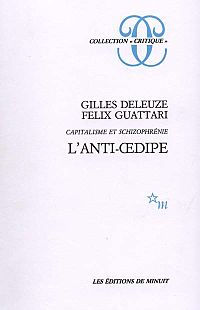
Anti-Oedipus: Capitalism and Schizophrenia is a 1972 book by French authors Gilles Deleuze and Félix Guattari, the former a philosopher and the latter a psychoanalyst. It is the first volume of Capitalism and Schizophrenia, the second being A Thousand Plateaus (1980).
Immanent evaluation is a philosophical concept used by Gilles Deleuze in his essay "Qu'est-ce qu'un dispositif ?" (1989), where it is seen as the opposite of transcendent judgment.
Multiplicity is a philosophical concept developed by Edmund Husserl and Henri Bergson from Riemann's description of the mathematical concept. It forms an important part of the philosophy of Gilles Deleuze, particularly in his collaboration with Félix Guattari, Capitalism and Schizophrenia (1972–80). In his Foucault (1986), Deleuze describes Michel Foucault's The Archaeology of Knowledge (1969) as "the most decisive step yet taken in the theory-practice of multiplicities."
20th-century French philosophy is a strand of contemporary philosophy generally associated with post-World War II French thinkers, although it is directly influenced by previous philosophical movements.
Paul Robert Patton is Scientia Professor of Philosophy in the School of History and Philosophy at the University of New South Wales, Sydney, Australia, where he has been since 2002. Patton is known for his publications and conference presentations on Australian Continental political philosophy.
Todd Gifford May is a political philosopher who writes on topics of anarchism, poststructuralism, and post-structuralist anarchism. More recently he has published books on existentialism and moral philosophy. He is currently Class of 1941 Memorial Professor of Philosophy at Clemson University.

The Logic of Sense is a 1969 book by the French philosopher Gilles Deleuze. The English edition was translated by Mark Lester and Charles Stivale, and edited by Constantin V. Boundas.
Gilles Deleuze, a French philosopher, and Félix Guattari, a French psychoanalyst and political activist, wrote a number of works together.

Nietzsche and Philosophy is a 1962 book about Friedrich Nietzsche by the philosopher Gilles Deleuze, in which the author treats Nietzsche as a systematically coherent philosopher, discussing concepts such as the will to power and the eternal return. Nietzsche and Philosophy is a celebrated and influential work. Its publication has been seen as a significant turning-point in French philosophy, which had previously given little consideration to Nietzsche as a serious philosopher.
Robert Hurley is a translator who has translated the work of several leading French philosophers into English, including Michel Foucault, Gilles Deleuze and Georges Bataille. For example, he led the team translating selections from Foucault's three-volume Dits et écrits, 1954-88.

Francis Bacon: The Logic of Sensation is a 1981 book by the philosopher Gilles Deleuze, in which the author creates novel concepts related to art, aesthetics, percepts and sensation through the example of the work of the celebrated English painter Francis Bacon. It was translated into English by Daniel W. Smith.
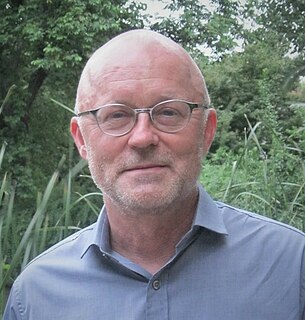
Daniel W. Smith is an American philosopher, academic, researcher, and translator. He is a professor in the Department of Philosophy at Purdue University, where his work is focused on 19th and 20th century continental philosophy.

Foucault is a book by José Guilherme Merquior about the French philosopher Michel Foucault, first published in 1985.
References
- ↑ Deleuze, Gilles (13 June 2006). Foucault. ISBN 9780826490780 . Retrieved 25 June 2018.